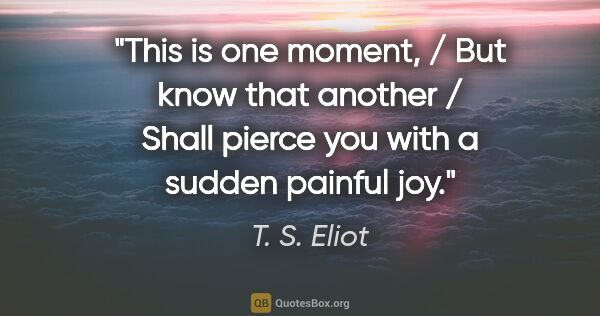Sudden Quotes (page 37)
Paradox is beloved of novelists. The despised savior, the humane whore, the selfish man suddenly munificent, the wise fool, and the cowardly hero. Most writers spend their lives writing about unexpected malice in the supposedly virtuous, and unexpected virtue in the supposedly sinful.
Thomas Keneally
...she felt a sudden, unexpected surge of hope. Despite the tragedy they'd all gone through, this was what a happy family looked like; this, she thought, is what a loving family did when they were together. For them, it was nothing but an ordinary day on an ordinary weekend, but for her, there was something revelatory about the notion that wonderful moments like these existed. And that maybe, just maybe, it would be possible for her to experience similar days in the future.
Nicholas Sparks
Just because things happen slow doesn't mean you'll be ready for them. If they happened fast, you'd be alert for all kinds of suddenness, aware that speed was trump. "Slow" works in an altogether different principle, on the deceptive impression that there's plenty of time to prepare, which conceals the central fact, that no matter how slow things go, you'll always be slower.
Richard Russo
But I'm afraid it can't be done."Certainly not; it can't be done," repeated the Humbug."Why not?" asked Milo."Why not indeed?" exclaimed the bug, who seemed equally at home on either side of an argument."Much too difficult," replied the king."Of course," emphasized the bug, "much too difficult."You could if you really wanted to," insisted Milo."By all means, if you really wanted to, you could," the Humbug agreed."How?" asked Azaz, glaring at the bug."How?" inquired Milo, looking the same...
Norton Juster
He was not sure, but liked it. It recurred when they met suddenly or had been silent. It beckoned to him across intellect, saying, "This is all very well, you're clever, we know—but come!" It haunted him so that he watched for it while his brain and tongue were busy, and when it came he felt himself replying, "I'll come—I didn't know."
"You can't help yourself now. You must come."
"I don't want to help myself."
"Come then."
He did come. He flung down all the barriers—not at once, for he did...
E. M. Forster

He did not like the grown-ups who talked down to him, but the ones who went on talking in their usual way, leaving him to leap along in their wake, jumping at meanings, guessing, clutching at known words, and chuckling at complicated jokes as they suddenly dawned. He had the glee of the porpoise then, pouring and leaping through strange seas.
T. H. White
My advice to a budding literary critic would be as follows. Learn to distinguish banality. Remember that mediocrity thrives on "ideas." Beware of the modish message. Ask yourself if the symbol you have detected is not your ownfootprint. Ignore allegories. By all means place the "how" above the "what" but do not let it be confused with the "so what." Rely on the sudden erection of your small dorsal hairs. Do not drag in Freud at this point. All the rest depends on personal talent.
Vladimir Nabokov
